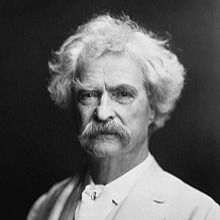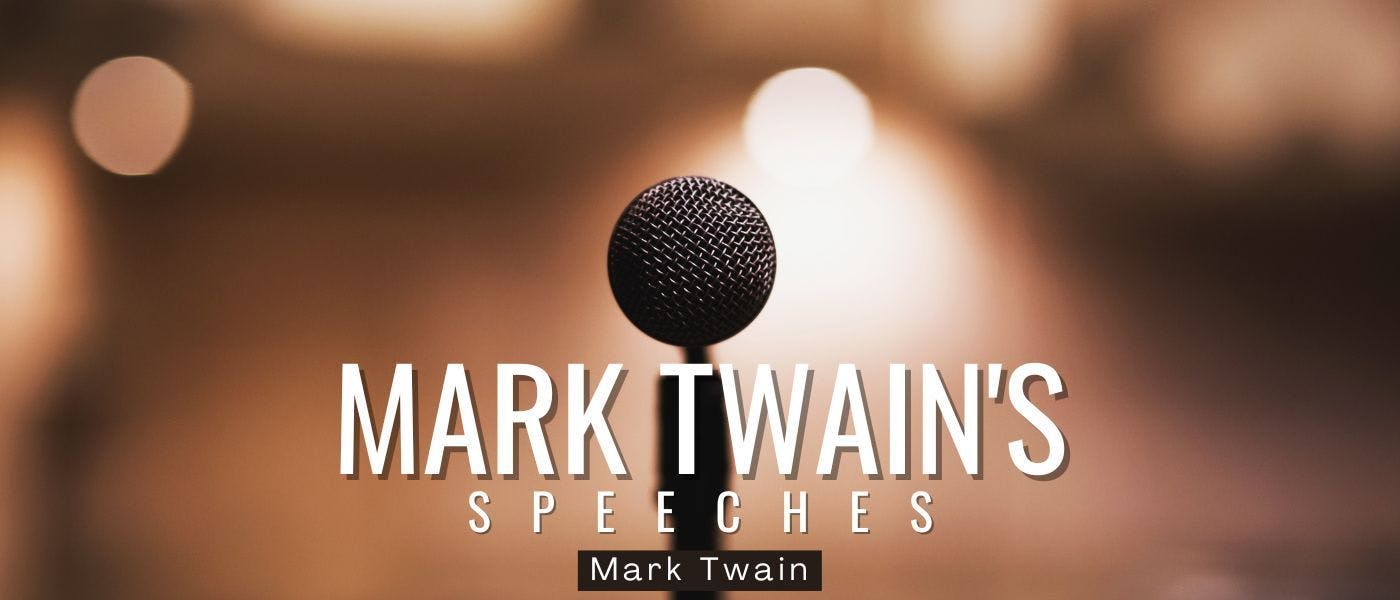Mark Twain's Speeches by Mark Twain, is part of the HackerNoon Books Series. You can jump to any chapter in this book here. ABOUT LONDON
ABOUT LONDON
ADDRESS AT A DINNER GIVEN BY THE SAVAGE CLUB,
LONDON, SEPTEMBER 28, 1872.
Reported by Moncure D. Conway in the Cincinnati Commercial.
It affords me sincere pleasure to meet this distinguished club, a club which has extended its hospitalities and its cordial welcome to so many of my countrymen. I hope [and here the speaker’s voice became low and fluttering] you will excuse these clothes. I am going to the theatre; that will explain these clothes. I have other clothes than these. Judging human nature by what I have seen of it, I suppose that the customary thing for a stranger to do when he stands here is to make a pun on the name of this club, under the impression, of course, that he is the first man that that idea has occurred to. It is a credit to our human nature, not a blemish upon it; for it shows that underlying all our depravity (and God knows and you know we are depraved enough) and all our sophistication, and untarnished by them, there is a sweet germ of innocence and simplicity still. When a stranger says to me, with a glow of inspiration in his eye, some gentle, innocuous little thing about “Twain and one flesh,” and all that sort of thing, I don’t try to crush that man into the earth—no. I feel like saying: “Let me take you by the hand, sir; let me embrace you; I have not heard that pun for weeks.” We will deal in palpable puns. We will call parties named King “Your Majesty,” and we will say to the Smiths that we think we have heard that name before somewhere. Such is human nature. We cannot alter this. It is God that made us so for some good and wise purpose. Let us not repine. But though I may seem strange, may seem eccentric, I mean to refrain from punning upon the name of this club, though I could make a very good one if I had time to think about it—a week.
I cannot express to you what entire enjoyment I find in this first visit to this prodigious metropolis of yours. Its wonders seem to me to be limitless. I go about as in a dream—as in a realm of enchantment—where many things are rare and beautiful, and all things are strange and marvellous. Hour after hour I stand—I stand spellbound, as it were—and gaze upon the statuary in Leicester Square. [Leicester Square being a horrible chaos, with the relic of an equestrian statue in the centre, the king being headless and limbless, and the horse in little better condition.] I visit the mortuary effigies of noble old Henry VIII., and Judge Jeffreys, and the preserved gorilla, and try to make up my mind which of my ancestors I admire the most. I go to that matchless Hyde Park and drive all around it, and then I start to enter it at the Marble Arch—-and—am induced to “change my mind.” [Cabs are not permitted in Hyde Park—nothing less aristocratic than a private carriage.] It is a great benefaction—is Hyde Park. There, in his hansom cab, the invalid can go—the poor, sad child of misfortune—and insert his nose between the railings, and breathe the pure, health-giving air of the country and of heaven. And if he is a swell invalid, who isn’t obliged to depend upon parks for his country air, he can drive inside—if he owns his vehicle. I drive round and round Hyde Park, and the more I see of the edges of it the more grateful I am that the margin is extensive.
And I have been to the Zoological Gardens. What a wonderful place that is! I never have seen such a curious and interesting variety of wild animals in any garden before—except “Mabilie.” I never believed before there were so many different kinds of animals in the world as you can find there—and I don’t believe it yet. I have been to the British Museum. I would advise you to drop in there some time when you have nothing to do for—five minutes—if you have never been there: It seems to me the noblest monument that this nation has yet erected to her greatness. I say to her, our greatness—as a nation. True, she has built other monuments, and stately ones, as well; but these she has uplifted in honor of two or three colossal demigods who have stalked across the world’s stage, destroying tyrants and delivering nations, and whose prodigies will still live in the memories of men ages after their monuments shall have crumbled to dust—I refer to the Wellington and Nelson monuments, and—the Albert memorial. [Sarcasm. The Albert memorial is the finest monument in the world, and celebrates the existence of as commonplace a person as good luck ever lifted out of obscurity.]
The library at the British Museum I find particularly astounding. I have read there hours together, and hardly made an impression on it. I revere that library. It is the author’s friend. I don’t care how mean a book is, it always takes one copy. [A copy of every book printed in Great Britain must by law be sent to the British Museum, a law much complained of by publishers.] And then every day that author goes there to gaze at that book, and is encouraged to go on in the good work. And what a touching sight it is of a Saturday afternoon to see the poor, careworn clergymen gathered together in that vast reading-room cabbaging sermons for Sunday. You will pardon my referring to these things.
Everything in this monster city interests me, and I cannot keep from talking, even at the risk of being instructive. People here seem always to express distances by parables. To a stranger it is just a little confusing to be so parabolic—so to speak. I collar a citizen, and I think I am going to get some valuable information out of him. I ask him how far it is to Birmingham, and he says it is twenty-one shillings and sixpence. Now we know that doesn’t help a man who is trying to learn. I find myself down-town somewhere, and I want to get some sort of idea where I am—being usually lost when alone—and I stop a citizen and say: “How far is it to Charing Cross?” “Shilling fare in a cab,” and off he goes. I suppose if I were to ask a Londoner how far it is from the sublime to the ridiculous, he would try to express it in coin. But I am trespassing upon your time with these geological statistics and historical reflections. I will not longer keep you from your orgies. ’Tis a real pleasure for me to be here, and I thank you for it. The name of the Savage Club is associated in my mind with the kindly interest and the friendly offices which you lavished upon an old friend of mine who came among you a stranger, and you opened your English hearts to him and gave him welcome and a home—Artemus Ward. Asking that you will join me, I give you his memory.
About HackerNoon Book Series: We bring you the most important technical, scientific, and insightful public domain books.
This book is part of the public domain. Mark Twain (2004). Mark Twain's Speeches. Urbana, Illinois: Project Gutenberg. Retrieved October 2022 https://www.gutenberg.org/cache/epub/3188/pg3188-images.html
This eBook is for the use of anyone anywhere at no cost and with almost no restrictions whatsoever. You may copy it, give it away or re-use it under the terms of the Project Gutenberg License included with this eBook or online at www.gutenberg.org, located at https://www.gutenberg.org/policy/license.html.

